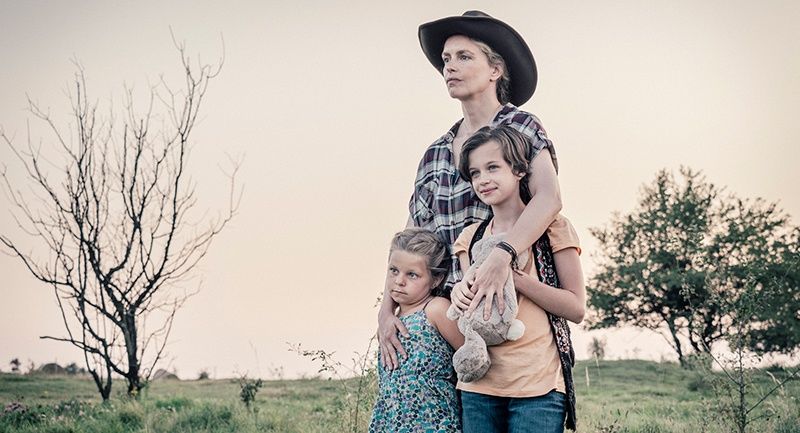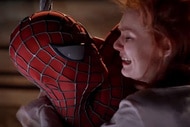Create a free profile to get unlimited access to exclusive videos, sweepstakes, and more!
Writer-director Katrin Gebbe on Pelican Blood, psychopathy, and the power of mothers

When a child's having a tantrum, everybody has an opinion and (often unsolicited) advice — yet nothing seems to help when it comes to curtailing the violent outbursts of the kid at the center of the German horror-thriller Pelican Blood. To connect to her 5-year-old adopted daughter Raya, devoted mother Wiebke is willing to do anything, risking her career, her health, her bond with her older daughter, and even her sanity. But even she isn't prepared for the possibility that this may be more than a behavioral issue born from trauma. Could her daughter be possessed by a demon?
Following Pelican Blood's U.S. premiere at Fantastic Fest, SYFY WIRE FANGRRLS sat down with its writer/director Katrin Gebbe to uncover her path to making this tale of motherhood and menace, as well as the secrets behind the force-of-nature performance of its captivating child actor, Katerina Lipovska.
Gebbe's path to filmmaking began in art school. She studied graphic design, sculpture, and painting abroad in the Netherlands and the U.S., where she fell in love with film. At Boston's School of the Museum of Fine Arts at Tufts University, she took classes that had her dealing not just with the art form but the physical film stock. "The material of film and the smell of it," she recalled. "It really grabbed me there."
After earning her bachelor's degree in design, she attended film school back in Germany, but it wasn't exactly as she'd dreamed.
"It was like the opposite of an art school," Gebbe explained. "It was very focused on getting you into the market and especially also the German TV market. There was a lot of rules on how you would have to make a film and I felt like, 'F*** you guys!'" She laughed, then continued. "I want to do it my own way. I mean, I appreciated very much all the content they gave me, and I really found people I would love to work with and have continued working with. But I felt like what they taught me content-wise was not totally what I wanted to explore."
Her desire to explore led to her feature directorial debut, Nothing Bad Can Happen, a crime drama that delves into faith and psychopathy. Through the story of "a Jesus freak who is enslaved by a family," she sought to see how one's morals might be twisted by dilemmas beyond their imagining. And it was continuing this thought that led to her follow-up, Pelican Blood.
"After Nothing Bad Can Happen," Gebbe said, "I was very excited about people who become offenders, criminals, and especially psychopaths. Like what was important for their way? Were they born like this? Or was there maybe an incident that made them evil? A trauma, this can be healed."
This birthed the concept for Pelican Blood, which would focus on a mother's journey to save her child from a path of destruction. "The mother of a child ... would have so much power, but also so much weight on her shoulders. And I felt the ideal of motherhood is very much questioned in these situations."
The sacrifices demanded of a good mother are at the core of Pelican's Blood, in which Wiebke faces violence from her daughter, judgment from others, and an ambiguous but relentless threat lurking in the shadows. All of this pressure weighs on Wiebke. "They feel, 'Oh, I want to be a good mother and I don't want to give up on a child,'" Gebbe said, speaking of such mothers, "But they cannot handle it, and their life maybe starts to be destroyed."
So what's a mom to do?
To better understand these challenges, Gebbe did plenty of research, speaking to neurologists, psychologists, and psychiatrists, and reading books written by adoptive mothers about troubled children. She also read about child development, specifically how the brain works and how empathy evolves. "I researched everything I could find," she said, adding, "I talked to mothers. I met some real people, which was very touching. In the end, I think it was the most important input for the film. Because when you are sitting with a person who really has had history with something like this, and you feel all the pain and all the doubts, that is something that is so important to keeping to [true to life]."
Part of keeping the film true to its inspirations was to make clear that not all adopted children are traumatized or suffer from behavioral issues like Pelican Blood's Raya. That's why Gebbe decided both of her heroine's daughters would be adopted. "I was thinking one kid could be the biological child," she said. "But I believe it's so great, foster parenting and adoption. And if I would have only shown the bad kid and the problems of adoption, I felt I am not doing right [by those I spoke to]. I'd be harming something that is really important. I mean, of course, there is a lot of trouble, but also there are so many people who are thankful that they got a kid or that a kid got parents. I felt I needed to show that there is also one kid that had a good relationship from the very beginning, and that opened up, and that was healthy. And that was a choice I had to make also, because I think it's politically correct."
Gebbe went on to share how her concern for real-life kids extended to the film's production, as did her reliance on mothers' input. To prepare young Katerina Lipovska for this intense role, Gebbe worked with child-acting coach Simona Popova, who by "happy luck" also happens to be the child actor's mom. "For me, it was really important to not traumatize Kati when she was playing a traumatized kid," Gebbe insisted. "Simona had a lot of great ideas for how I could approach certain scenes and what we would tell Kati and whatnot."
One advantage they had in protecting Lipovska from the film's darker elements was that the girl didn't speak German. So a lot was blessedly lost in translation. In particular, there's one turbulent scene when her character throws down some seriously harrowing threats to her onscreen mother (Nina Hoss). But Lipovska was shielded from the brutality of her dialogue, as she learned her lines phonetically. "She doesn't know what she's saying," Gebbe said, explaining the girl was only taught the sounds and their motivation. "[Popova] told her that she would need to fight for something. She believes she's right. She's fighting for her right. And so we believe [Raya] is angry, but she has a child's anger. So she can scream, and we can protect [Lipovska]."
This collaboration with Lipovska and Popova proved absolutely crucial to eliciting the performance that has had audiences out of the Venice Film Festival, TIFF, and Fantastic Fest riveted and rattled. "That was really helpful, because then I was also feeling safe to demand more," Gebbe said. "Because otherwise I would maybe be not so sure about how far can I go with the kid. But we always found a way so the kid had really a lot of fun and felt very protected."
In this way, Pelican Blood's reality reflects its art. In both its making and its plotline a group of women and girls comes together to do something difficult — and a bit mad — to strive for something incredible.
Pelican Blood made its US premiere at Fantastic Fest.














